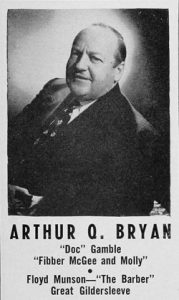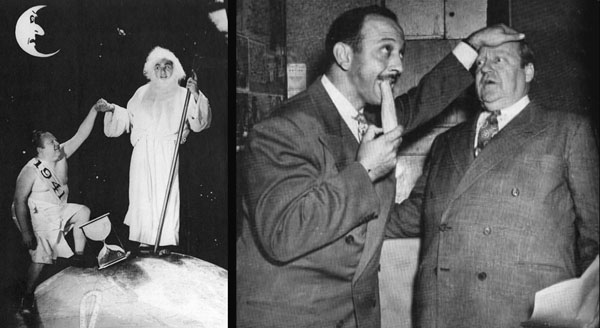
Today’s installment of Radio Round-Up explores the radio career of Arthur Q. Bryan, best known as the voice of Elmer Fudd…
 Born in Brooklyn in 1899, Arthur Quirk Bryan started as a concert singer and performed in choirs at various churches in New York City. By 1918, he was an insurance clerk at the Mutual Life Insurance Company, but aspired to become a concert singer. Press stories on Bryan’s career noted that his work in radio started in 1924, but recent evidence—from a radio listing— indicates his first appearance as a singer happened at WGBS in June 1926, on early Thursday evenings.
Born in Brooklyn in 1899, Arthur Quirk Bryan started as a concert singer and performed in choirs at various churches in New York City. By 1918, he was an insurance clerk at the Mutual Life Insurance Company, but aspired to become a concert singer. Press stories on Bryan’s career noted that his work in radio started in 1924, but recent evidence—from a radio listing— indicates his first appearance as a singer happened at WGBS in June 1926, on early Thursday evenings.
 He continued as a tenor soloist at WEAF by 1928, while also performing with the Seiberling Singers and the Jeddo Highlanders. In 1929, he became an announcer for WOR in New Jersey. Among the programs he announced was for the children’s radio host “Uncle Don” Carney. Bryan left WOR in 1931, and was hired by WCAU in Philadelphia as a writer/performer. He remained in the East Coast—as he shifted from different stations—until 1936, when he decided to move to Hollywood to become a scenario writer for Paramount Pictures.
He continued as a tenor soloist at WEAF by 1928, while also performing with the Seiberling Singers and the Jeddo Highlanders. In 1929, he became an announcer for WOR in New Jersey. Among the programs he announced was for the children’s radio host “Uncle Don” Carney. Bryan left WOR in 1931, and was hired by WCAU in Philadelphia as a writer/performer. He remained in the East Coast—as he shifted from different stations—until 1936, when he decided to move to Hollywood to become a scenario writer for Paramount Pictures.
This venture into screenwriting wasn’t successful, and Bryan went into KFWB, a local radio station owned by Warner Bros. He performed on a show called The Grouch Club, with “grouch-master” Jack Lescoulie, which first aired around 1938. The show revolved around a discussion of people who wished to complain about everyday life, in which Bryan played a regular part as “The Little Man.” He spoke with a speech impediment similar to rhotacism—unable to pronounce “L” or “R” sounds, with “W” in its place, which he used throughout many of his roles in animation and radio.
The animators and directors at Warners frequently visited KFWB, which was few buildings away from the animation department on Sunset Boulevard. Tex Avery heard Bryan’s performance and used the voice for Dangerous Dan McFoo (1939), where the diminutive character is introduced and looks to the audience saying, “Hewwo, ev-webody!” Here is an excerpt from The Grouch Club, from a February 21, 1940 broadcast:
In the early 1940s, Bryan provided the voice for Elmer Fudd for his first crystallized appearance in Elmer’s Candid Camera (1940). He continued to voice Elmer for Warner Bros., while also performing on different radio programs. The same year of the definitive Bugs and Elmer encounter in A Wild Hare (1940), Bryan joined the cast of Al Pearce and His Gang as “Waymond Wadcliffe.” By 1941, Bryan appeared on a show called Nitwit Court, which often featured Mel Blanc and Sara Berner, though no episodes are known to exist in circulation. Not many of Al Pearce’s broadcasts are widely circulated, but here is a guest appearance with the character on The Jack Benny Program, from November 16, 1941:
Though he played supporting characters on radio, Bryan starred in a short-lived summer replacement series called Major Hoople in 1942. Sadly, like Nitwit Court, no episodes are known to exist. A short time later, in the fall of that year, Bryan became a regular cast member on The Great Gildersleeve. He assumed different roles before playing as Floyd Munson, the barber—a character first played by Mel Blanc. In the spring of 1943, Bryan played a regular part as Doc Gamble on Fibber McGee and Molly, an alternative adversary to McGee after his former neighbor Thockmorton Gildersleeve moved to his own program. Here is an excerpt from a June 8, 1943 broadcast, where listeners will notice the vast difference between the contemptuous physician on this show and the dimwitted hunter Elmer Fudd:
Bryan often migrated to New York for different radio programs. In 1947, he spent a few weeks on the East Coast on The Milton Berle Show, but did not become a regular cast member. His performances on radio displayed a broader acting range than heard on his comedy and variety appearances. Bryan acted in several episodes of Lux Radio Theatre and Screen Directors Playhouse throughout the 1940s. These anthology series broadcast adaptations of movies, with some of the original actors involved during production. For one such example, Bryan played the role of the angel-in-training Clarence in the Screen Directors Playhouse production of Frank Capra’s It’s A Wonderful Life (1946), broadcast on May 8, 1949:
In the mid-1940s and early 1950s, Bryan appeared on several crime dramas and detective shows including Adventures of Phillip Marlowe (1947-58), Jeff Regan, Investigator (1948-50), The Man from Homicide (1950-51), and Richard Diamond, Private Detective (1949-53), which starred actor Dick Powell. In Richard Diamond, he took over the role of Lieutenant Walt Levinson from Ed Begley for a brief period. Here is an excerpt from a November 22, 1950 broadcast:
Throughout the 1950s, Bryan’s vocal performances in radio and animated cartoons kept him busy. He continued to portray his most enduring radio character Floyd Munson on The Great Gildersleeve until 1955, and retired his role of Doc Gamble on Fibber McGee and Molly two years later. His last voice recording for Warner Bros. was as Elmer Fudd in Friz Freleng’s Person to Bunny (1960), which occurred on January 2, 1959. Several months later, in November, Bryan succumbed to a sudden attack at the age of 60. Voice actor Hal Smith took over the voice of Elmer Fudd by the following year.
For clarification on Bryan’s career in animation, he wasn’t restricted to play only in the same speech patterns mainly used for Elmer Fudd. On two occasions, director Chuck Jones allowed him to play different characters in his cartoons—he uses his normal voice as the exhausted businessman in A Pest in the House (1947) and uses a French accent as the casting director in Past Perfumance (1955).
As a special bonus, here is some brief footage of Bryan as “Waymond Wadcliffe,” either from the late 1930s or early 1940s.

ABOVE: With Al Pearce (at left), with Mel Blanc (at right). BELOW: FUDD au natural

(Thanks to Keith Scott and Yowp for their help.)


 DEVON BAXTER is a film restoration artist, video editor, and animation researcher/writer currently residing in Pennsylvania. He also hosts a
DEVON BAXTER is a film restoration artist, video editor, and animation researcher/writer currently residing in Pennsylvania. He also hosts a 



















































































What a great, fascinating post! How strange to hear Elmer Fudd playing Clarence opposite Jimmy Stewart’s George Bailey! Thanks for this!
Superb article! Jones’ memoirs have a hand-drawn map which shows how close KFWB was to the Schlesinger shop.
Pewhaps the gweatest homage to Bryan’s wegacy is Gilda Radner as Baba Wawa and Madeline Kahn as Mawena Dietwich in the classic SNL sketch, “Not for Ladies Only.” http://www.nbc.com/saturday-night-live/video/not-for-ladies-only/n8633?snl=1
And Madeline Kahn did the same voice as Lili in Mel Brooks’s “Blazing Saddles”. Both Gilda and Madeline passed too young, from the same disease.
Madeline Kahn gives an inspired performance as Lili Von Shtupp. “A wed wose. How womantic.”
Just a note: Major Hoople was the star of a long-running newspaper comic, “Our Boarding House.” Hoople was a faintly W.C. Fieldsian braggart, playing off his no-nonsense wife, the wisecracking bachelor boarders in their boarding house, and the more kindred spirits at the Owls Club. He wore a fez around the house. It was still running in the late 60s when I read it. Carroll O’Connor did a Hoople bit in a Raquel Welch TV special based on the funny pages.
“Our Boarding House” ran until 1984, surviving mainly in small-town dailies that were the NEA syndicate’s bread-and-butter by then. In 1966, Willard Manus’ novel “Mott the Hoople”- about a young man named Norman Mott who identified with Major Hoople’s lack of success in finding success – was published. The British rock group known for “All the Young Dudes” took their name from that book.
It always irritated me when George Bailey kept being surprised, after seeing a couple of examples of the altered “you were never born” reality, that things as he knew them were out of whack. By the time Clarence shows him his wife, he should be saying Okay, I get it, can we go back now?
And Arthur Q. Bryan can’t help slipping into his Fudd voice a couple of times. “Guardian Angel, First Cwass”.
When the Lux Radio Theatre adapted “It’s a Wonderful Life,” they cast Victor Moore as Clarence. (If I recall, Moore subbed for Elmer in “Ain’t That Ducky.”)
I listen to “Fibber McGee and Molly” regularly on Radio Classics(Sirius XM channel 148) and oh, god, he is hilarious on that show. They all are..I’ve nearly choked while driving!
I wonder if “Crow’s Feat” (1962) was originally supposed to have dialogue from Elmer Fudd but was changed to a non-speaking part in light of Bryan’s death. Anyone know?
I remember seeing once on TCM a Warner Bros. short from the late 1930s based on ‘The Grouch Club’ that featured Bryan as ‘The Little Man’ trying to return an overdue book to the library.
Bryan was also featured in a Columbia comedy short with Charley Chase, I believe it’s “South of the Boudoir”. He mainly plays it straight as Chase’s uptight boss, but he does slip into his Fudd voice pattern at one point.
He pops up in quite a few live action features and shorts, including some delightful 1950s Joe McDoakes, also made by Warner Brothers. Most amusing is his traveling salesman who becomes a part of the wall paper in SO YOU WANT TO BE A PAPER HANGER and as colorful narrator of SO YOU WANT TO BE A POLICEMAN.
It is indeed SOUTH OF THE BOUDOIR. We ran it at Cinecon a few years ago and when he switched to the Fudd voice, the entire audience howled. Interestingly, BOUDOIR was released ten weeks before WILD HARE, so it certainly would not have gotten the same reaction in 1940.
Interesting to note that the earlier ‘fat’ Elmer Fudd resembles Bryan.
Yes, Avery was the first to use Bryan in a cartoon, based on his Little Man role on THE GROUCH CLUB. Robert Bruce, who narrated various Warner Bros. cartoons from 1939-59, said there was a KFWB stock company for the various comedy and dramatic programming coming from the Warner station. These players included Bruce himself, Arthur Bryan, Jack Lescoulie, Alan Ladd and others, and it was in the DANGEROUS DAN McFOO cartoon we first heard both Bryan doing his Fudd-esque voice, and Bob Bruce as the narrator (Bruce and Blanc contributed several bit parts too). The GROUCH CLUB short film mentioned above in David’s post was called The Great Library Misery. Not exactly sure, but it could be Bryan moonlighting at Metro in the 1952 Tom & Jerry Oscar winner TWO MOUSEKETEERS.
I heard an interview with Billy West where he said that June Foray had implied to him that Arthur Bryan was a pedophile. Anyone care to comment on this?
According to WhosDatedWho, he’s single and had no past relationships (http://www.whosdatedwho.com/dating/arthur-q-bryan)
Of course, it’s Billy “Howard Stern Regular” West.
Arthur Q. Bryan is of Irish origin and he is a big man with a big heart.
My Dad and his twin brother — aspiring radio actors — used to hang around KFWB in Los Angeles and the Hollywood Canteen looking for radio personalities they could meet and autograph. For the rest of their lives, they always spoke of Mr Bryan as the nicest — by far — of all those they met.